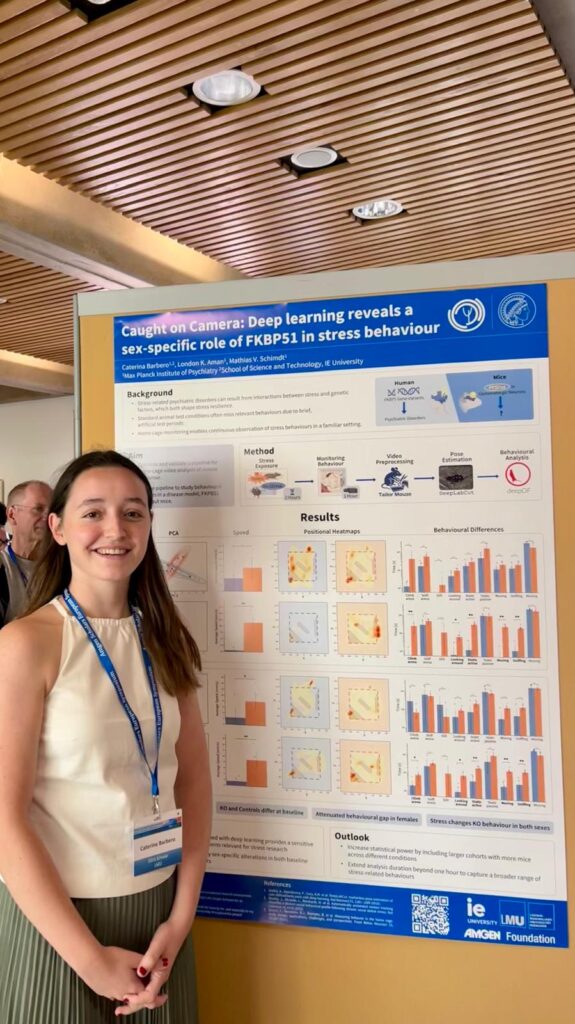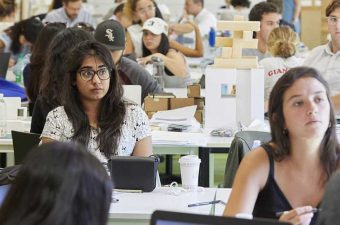For Caterina Barbero, a student pursuing the Bachelor in Computer Science & Artificial Intelligence, the answer was a summer of discovery spent across Europe. From Munich to Cambridge, she was able to transform course theory into real-world research and uncover how technology can deepen our understanding of the human brain.

As part of the Amgen Scholars Program, a prestigious undergraduate summer research initiative, Caterina spent nine weeks at Ludwig Maximilian University of Munich (LMU). She worked in collaboration with the Max Planck Institute of Psychiatry.
While there, Caterina contributed to an ambitious research project. Her work focused on optimizing and applying AI models to home-cage recordings of mice. These recordings were compared with those of genetically modified mice to investigate the role of a gene linked to stress-related behavior. The research could play an important role in how we understand brain health. Caterina explains,
“Certain genetic variants of the gene we studied are associated with a higher risk of psychiatric disorders in humans. Some research groups are developing drugs targeting its protein product. Understanding this gene could reveal why some people are more resilient to stress, opening the door to new therapeutic strategies.”
Bridging AI and neuroscience
Caterina’s research merged computer science, artificial intelligence and neuroscience. She incorporated convolutional neural networks, a type of computer vision model, to train a pose estimation system. The goal? To track mice behavior across video frames.
Initially, the model struggled to adapt to the animals’ wide range of behaviors. Through extensive preprocessing and retraining, Caterina was able to refine the system until it performed consistently and accurately.
“I really enjoyed learning about the experimental process and working in a highly multidisciplinary environment. It gave me the opportunity to deepen my understanding of neuroscience and biology, while also applying my computational background,” she said.
IE University courses on machine learning and convolutional neural networks gave Caterina the technical foundation for her work. She soon discovered, though, that the soft skills she developed in the classroom were equally important.

As the only fully computational researcher in the lab, she often had to explain technical problems to people from a variety of backgrounds and adapt her approach to different levels of expertise.
Entrepreneurial mindset in action
The emphasis on entrepreneurship and creative problem-solving at IE University shaped how Caterina approached challenges and helped her innovate on the job. The lab was using a cumbersome tool to preprocess the rat videos, but they didn’t have a readily available alternative.
As a side project, Caterina developed a lighter and more efficient tool for the research team, directly improving workflow. Her solution helped save her time and streamlined her team’s data management. Her efforts left a resource that future researchers could continue to build on.
From Munich to Cambridge: Recognition on the European stage
The internship culminated with a trip to Cambridge, where Caterina presented a poster on her research at the Amgen Scholars European Symposium. The three-day event brought together 50 students to showcase their work, selected from over 2,000 applicants.
At the symposium, Caterina engaged with fellow scholars, researchers and industry professionals about her project.

Thanks to her poster’s design and her presentation skills, Caterina received an award recognizing her work as one of the best posters at the event.
“Since the program only lasted nine weeks, we had to work hard and stay focused to move our project forward. It was an intense experience, but seeing all the work summarized in a poster and having the chance to present it to such brilliant individuals was incredibly rewarding. It made all the effort worthwhile,” she said.
Caterina’s experience at the symposium also fostered networking and inspiration. She attended talks on “Lives in Science,” where she learned from Cambridge researchers and alumni about diverse career paths and got the opportunity to discuss her own aspirations.
Paving the way for future research
Looking ahead, Caterina plans to pursue another research internship next summer, ideally in theoretical machine learning. In the meantime, she’s continuing her work at CyPhy Life, a research group in the Robotics and AI lab at IE University focused on AI, automation and human-computer interaction projects.
For students looking to start their research journey, she offered some valuable advice: “Start looking for opportunities early and don’t be afraid to reach out directly to head researchers to show genuine interest in their work.”
Caterina’s experience highlights how IE University equips students with the mindset, skills and exposure to make an impact in cutting-edge fields, even at an undergraduate level.
From mastering AI tools to bridging disciplines and presenting research internationally, IE University students are prepared to accelerate scientific discovery from day one.
Discover how IE University connects you to research opportunities to accelerate your future in AI.



